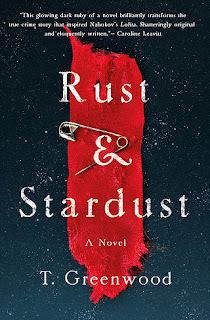Kate Christensen is one of those writers you just want wonderful things to happen to. And they have. And they do. First off, she's the author of The Great Man, which won the 2008 PEN/Faulkner Award for fiction; two food-centric memoirs, Blue Plate Special and How to Cook a Moose,
which won the 2016 Maine Literary Award for Memoir. She lives in Portland, Maine and the White Mountains of New Hampshire with my husband and dog.
THE LAST CRUISE is about final voyages..or maybe not for the passengers of the cruise ship Queen Isabella. But the times and the people change in ways you never seen coming. And I'm thrilled to share some of the raves for the book:
THE LAST CRUISE is about final voyages..or maybe not for the passengers of the cruise ship Queen Isabella. But the times and the people change in ways you never seen coming. And I'm thrilled to share some of the raves for the book:
Excellent… Above deck are wealthy
vacationers dining on caviar and Lobster Thermidor. But below,
conditions are hardly different from a Third World factory. Christensen
gamely traverses both worlds in this waterborne upstairs-downstairs
drama.
I always am curious why this novel, why this moment. What were you thinking about that propelled or haunted you into writing this?
“The Last Cruise” came out of a generalized, ongoing sense
of alarm and despair, along with nostalgia for the postwar glow of the 20th
century, its elegance and decadence and culture—I wasn’t born yet, so this is
of course a wholly romantic and naïve nostalgia, but I feel it nonetheless. The notion of a Last Cruise feels like a
metaphor for America’s 73 years of peace and economic prosperity, now coming to
an abrupt and apparent end.
“Wherever you go, there you are”? Ha! Yes. People on a
cruise bring their own personal histories, unfulfilled desires, and deepest
fears on board. I populated my nostalgia cruise with three protagonists. Two of
them are employed to work on the cruise, as galley crew and entertainment.
Christine, the lone passenger of the trio, a farmer from Maine, tries to enjoy
the passive luxury, but when things go “pear-shaped” halfway through, she is
perversely glad, awakened, galvanized. This comes out of my own need to have a
role, something to do. When I’m not engaged in work of some kind, I don’t quite
know who I am. So vacations can be disorienting. All three of my protagonists
are like me in this way: their work ethic defines them, gives them their
identities. When the shit hits the fan, they ask, What can I do? not, Who will
save me?
And yes: I’ve never been on a cruise, because I, like you, have
a near-phobia of them. The idea of being on a huge floating pleasure dome
crowded with strangers indulging in “leisure activities” and wanton gluttony in
the terrifying middle of the ocean—none of that sounds remotely fun to me. To
me, that’s just asking for trouble, as so many news stories have borne out, dire
tales of norovirus outbreaks, engine room fires, people falling overboard,
crimes on the high seas, not to mention shipwrecks.
Also, this will no doubt enrage many happy cruise-goers, but
I disapprove of cruises. A modern cruise ship is first and foremost a corporate
moneymaking machine, a polluting, crowded, floating mega-resort whose luxuries
are predicated on the labor of the exploited workers below decks. So the Queen Isabella strikes me as a perfect
vessel, pun half-intended, to carry certain burdens—existential, emotional, and
actual.
There’s a line in the book, where one character looks at
another, whose face is astonished, and full of anticipation. That stopped me because I often feel we’ve
lost the capacity to wonder about ourselves and our futures. It feels to me
from what I know about you that that’s the way you live your life. Am I right?
Um. Yes. This has been true since I was born, and I have
never outgrown it or learned to temper or repress this tendency in myself.
Apparently, I “feel things (too) deeply.” And I know this to be true. But being
prey to the more difficult emotions—anxiety, sadness, despair, grief, rage,
turmoil—allows me to feel the beautiful ones too—joy, exaltation, awe, wonder,
passion, deep love. At various times in my life, I’ve been strongly advised to
go on antidepressants or SSRI’s. I’ve been told I’m “overly sensitive,” “too
intense.” But for me, these responses and reactions tell me what matters, what
is right and wrong. Deep passion can be a call to action and an ethical guide,
if you use it that way, if you’re not self-indulgent or narcissistic, but
rather concerned with a greater good.
What’s obsessing you now and why?
Oh God—the same thing we’re all obsessed with, or sadly, only
54% of us, according to the latest polls. How the hell are we going to deal
with this unholy, terrifying mess we’re in? As a country, a culture, a planet?
How will we rise to this? How will we go on in the face of what’s coming? How
many of us will do what’s right? Primarily, I’m obsessed with the fact that we
are all interdependent and interconnected, all living things on earth, from
redwoods and whales down to bacteria and microbes, and this is becoming more
and more crucial and apparent.
What question didn’t I ask that I should have?
I think I’ve gone on long enough…. Thank you, Caroline.
AND BONUS QUESTION: What does Angus want everyone to know?
The best things in life are swimming in a lake, chasing
squirrels through the woods, licking someone’s face, lying in the shade on a
front porch watching the birds, and chewing a squeaky chicken. Everyone should
do those things all day long, and nothing else.
















